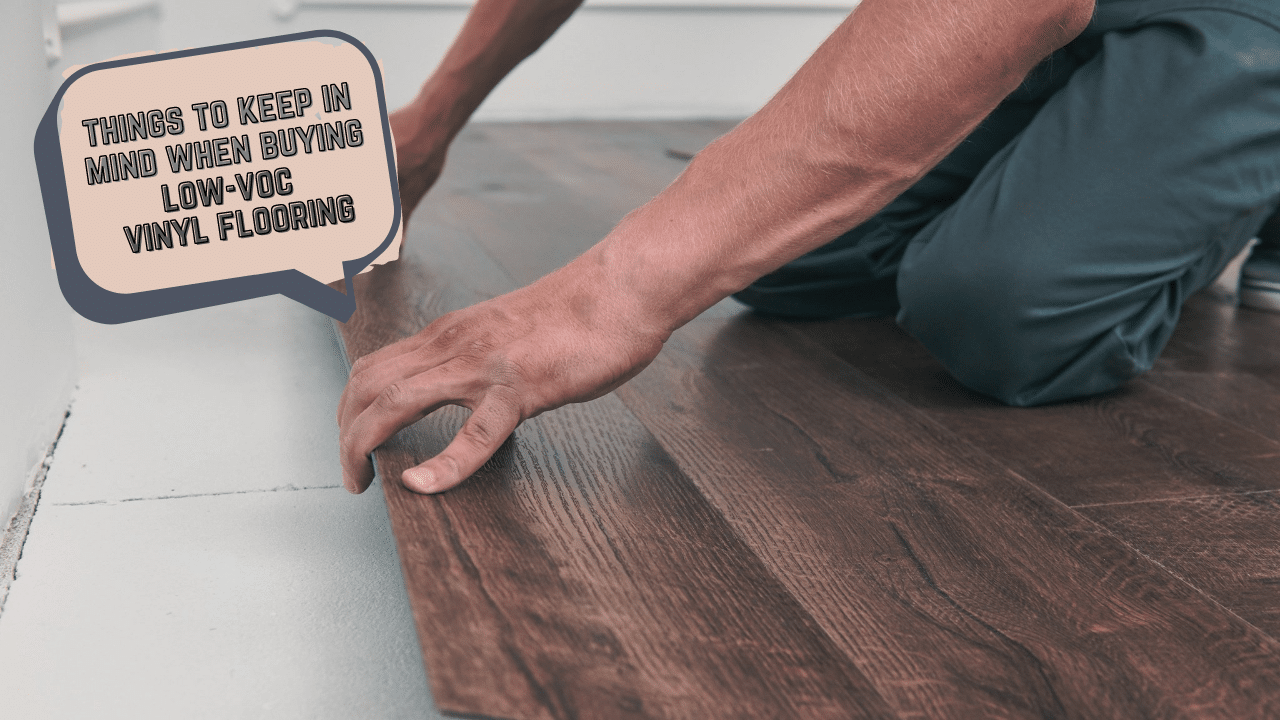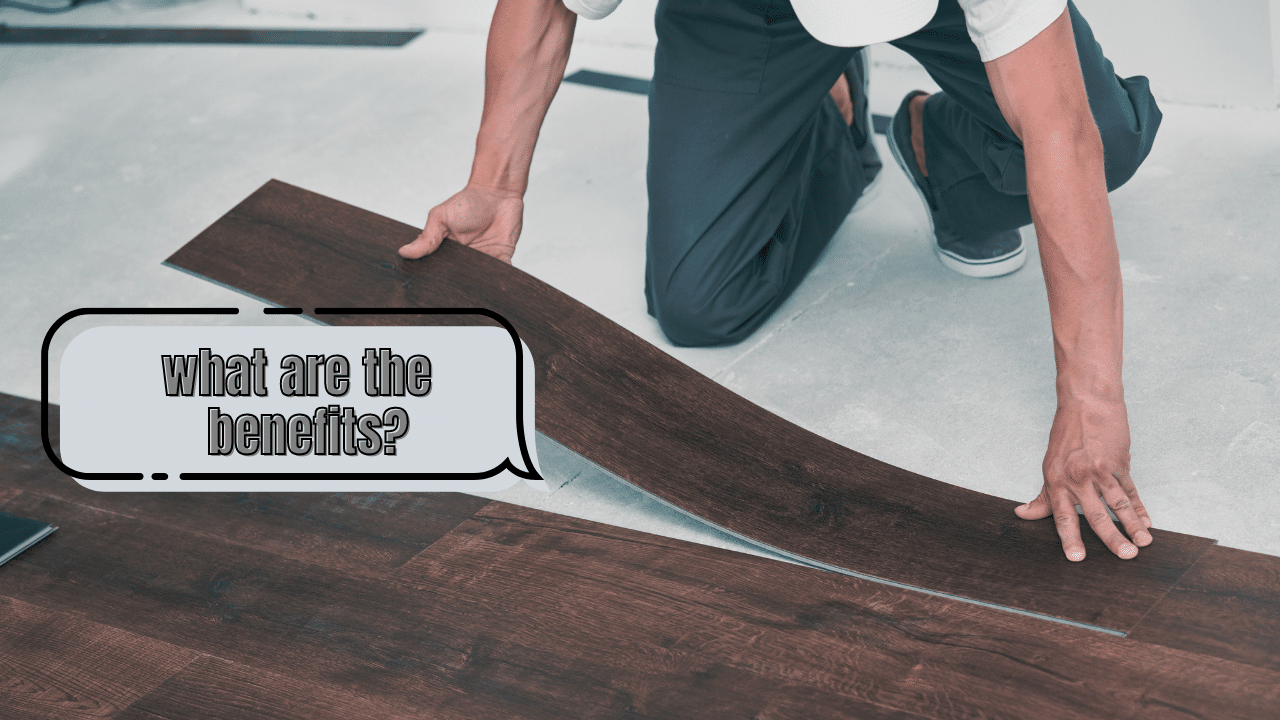Who doesn’t love luxury vinyl floors? We know this flooring type has more benefits than setbacks– but it doesn’t mean it’s perfect.
If you want to keep a healthy home– you’ll benefit from choosing low-VOC (Volatile Organic Compounds) vinyl floors, AKA the non-toxic type. This eco-friendly option has high durability and is considered the safest vinyl flooring option in the market today.
Non-Toxic Vinyl Flooring
You’ll be surprised to know some vinyl flooring options contain harmful chemicals. Case in point: vinyl floors with high VOC levels (toxins) may put your health at risk.
Your family’s health must always come first– so it’s your responsibility to choose low VOC vinyl floors that are free of any dangerous substances.
Fortunately, low-VOC vinyl is becoming more common today due to its increasing popularity.
8 Tips in Buying Low-VOC Vinyl Flooring

Here are some tips to keep in mind as you buy low VOC vinyl flooring.
1. Opt for Phthalate-Free Vinyl Products
Generally, phthalate is used to increase the durability and flexibility of plastic material. This chemical is common in many vinyl floors, toys, and detergents.
Experts suggest avoiding vinyl floors with phthalate– especially as you may breathe in chemicals or ingest dust.
Children, in particular, are more vulnerable as they have frequent hand-to-mouth behavior. Many manufacturers are now featuring phthalate-free vinyl floors. So, it won’t be too difficult for you to choose one!
2. Choose 100% Virgin Vinyl
Most homeowners prefer recycled vinyl, given its green benefit. However, virgin vinyl floors prove the better choice to ensure your health and safety.
It is an eco-friendly choice with a lower VOC. Since it is highly durable and stable, you can count on your new floors to last you for many years. This material is free of any heavy metals and ortho phyllite. Ortho phyllite is harmful not only to people but also to your furry friends.
3. Leverage your Sense of Smell
We get how this third tip sounds a bit bizarre– but following your nose can help you choose the best non-toxic vinyl floors for your home needs. This is because you can smell VOCs. If you notice a slight smell, chances are it may wear off in the long run. However, avoid floors with a strong odor (that makes you feel ill).
Vinyl floors with high VOC levels can be dangerous for you and your family. It can fill your entire house with toxic odors– which is also called outgassing. Eventually, it may also cause indoor pollution.
According to the EPA, you should be warier of indoor pollutants than outdoor ones. These are situated in areas without proper air circulation, thus increasing your exposure to asthma and allergies.
4. Select Known Non-Toxic Vinyl Brands
The good news is: it’s easy to find several safe vinyl flooring brands in the market today. For instance, consider products from Proximity mills as you shop. This brand is known to offer low VOC vinyl flooring options.
Another option to consider is Adura– Mannington’s line of LVP. Since these floors meet indoor air quality standards, it’s a great low VOCs flooring choice. (Related: EVP and LVP: Which Vinyl Plank Is Right for Your Project?)
Pro tip: A simple Google search will lead you to plenty of other non-toxic vinyl brands. Accordingly, always check online reviews first and purchase from a certified and tested brand.
5. Choose the Right Look for Your Home
As you shop for non-toxic vinyl floors, another factor to keep in mind is its look. Choose floors that complement your interior decor.
Keep in mind that every homeowner has the right color and design of vinyl floors. Fortunately, vinyl floors are widely available in several decorative, stone, and wood looks. Wood-like vinyl planks are increasingly popular today. Meanwhile, low VOC decorative vinyl also proves to be a unique choice. It comes with plenty of fun designs, including star and striped patterns.
6. Be Mindful of Discoloration
While most vinyl planks fade over time, their discoloration level also determines their toxicity. If the planks discolor to a great level, the air quality in the living space is reduced.
Another method to distinguish if your new vinyl floors are truly non-toxic is placing them in areas with frequent sunlight exposure. If you notice, it takes quite a while before the color starts to fade– the vinyl material is most likely less toxic.
7. Choose Non-Toxic Adhesives
Flooring glue may also have dangerous chemicals. If you are planning to use adhesives in your floor installation, consider buying low-VOC glue as well.
8. Follow Safety Precautions to Reduce Exposure during Installation
In installing your non-toxic vinyl floors at home, always ensure proper air circulation by keeping the windows open as much as possible. You may also want to wear a mask during the entire installation process.
Don’t forget to keep any children or pets away from the area to limit possible exposure. Lastly, use an air purifier in the room for a few weeks after installing your new floors.
Benefits of Low VOC Vinyl Floors

Let’s discuss the different advantages of installing low-toxic vinyl floors at home.
Conclusion
Vinyl plank flooring gained an infamous reputation of being toxic and harmful. The truth is, the material is only considerably “toxic” if it’s made with high VOC or harmful substances.
Most manufacturers today opt to produce safe-to-use vinyl planks given popular demand. Non-toxic vinyl flooring is an excellent way to ensure the ideal air quality in your home. If your heart is still not entirely into this option, you may want to consider other healthier flooring alternatives instead.
Frequently Asked Questions (FAQs)
What are some healthier alternatives for vinyl plank floors?
Since several vinyl flooring manufacturers still sell dangerous products, you may want to consider other healthier flooring alternatives for home use. This includes natural carpet floors, ceramic tiles, linoleum, and hardwood floors.
Is vinyl flooring safe?
Most google results will show you that vinyl flooring ranks one of the lowest among the list of eco-friendly flooring when it comes to VOCs. The positive side is that there is a significantly significant difference between low-VOC vinyl and not-so-low vinyl flooring. Overall, you can find low-VOC vinyl flooring and low-VOC adhesives that are safe for your home and family.
What are the main types of VOCs?
Since there are various kinds of volatile organic compounds, you must know the most common ones to help when shopping for your new floors. The list of common VOCs include: Benzene, Ethylene glycol, Formaldehyde, Tetrachloroethylene, Toluene and Xylene.
Why should I be concerned about VOCs?
VOCs can do a number on your health. They can lead to headaches, nausea, dizziness, long-term breathing complications, and worse. It can have a considerable effect on your and your family’s health. Exposure to VOCs can result in nausea, headache, dizziness, long-term breathing complication, and other life-threatening effects.
